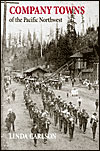book
Company Towns of the Pacific Northwest
by Linda Carlson '73 :: University of Washington Press :: Reviewed by Kathie Meyer '92

In Company Towns of the Pacific Northwest, Linda Carlson provides much insight into the rewards and trials of life in the small, isolated communities of a bygone Northwest.
A company town was generally a glorified camp established in the late 1800s by a logging or mining company. The company provided housing for its workers, and often mandated the school curriculum, owned the general store, and decided whether or not alcohol and gambling were allowed. A few paid their employees in scrip, the company's own currency. There was no local government, as the company boss dictated just about anything he wanted. Nevertheless, Carlson '73 defines these communities as towns, because they possessed all the attributes of town life such as libraries, volunteer fire departments, Boy Scout troops, and other necessities or amenities.
Carlson paints a detailed picture of company town life in Washington, Oregon, and Idaho, augmenting her narrative with a generous selection of photographs. Although it may seem that she romanticizes company towns a bit in the book's early chapters on demographics, housing, food, education, religion, and recreation, the balance tips as Carlson describes the isolation residents endured and the horrifying fatality and injury rates they were subject to. Lumbering was five times more likely to kill workers than any other turn-of-the-century industry, and dismemberment in the sawmills was so common that if a man had all 10 fingers, he was probably a relatively new employee.
Another hazard was that these towns existed at the pleasure of the companies that owned them. When it became no longer economically feasible for companies to behave paternalistically, their towns either suffered gradual demise or ended abruptly. Not all the towns folded up, however. Some, such as Port Gamble and Holden, both in Washington, survive today sans company ownership.
I found one logging town, McCleary, Washington, established in the early 1900s, most remarkable. Say what you will about anti-union timber baron Henry McCleary, who built the town, he obviously had a heart of gold, as illustrated by stories in which he typically saved an elderly former employee from the poor farm or personally accompanied an injured man on the long trip to the Tacoma hospital. The most fascinating McCleary story concerns three teenagers who started the town newspaper in a building which also housed a bordello. The boys eventually sold the newspaper to fund their college education. One of them, Roy Craft, went on to become Marilyn Monroe's press agent. Carlson includes stories like these throughout the book.
Company Towns is a fascinating human account of small-town ingenuity and community spirit. Erudite in its analysis, yet easy to read, it's just what you'd want to find in a history book of any kind.